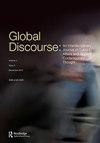Gender, power and international (mis)recognition: Russia’s quest for epistemic agency through the ‘civilisational’ crusade against the rights of sexual and gender minorities
IF 1.4
Q2 INTERNATIONAL RELATIONS
引用次数: 0
Abstract
This article explores Russia’s quest for agential equality with the US through the lens of the gendered dynamics of international (mis)recognition. It draws on the constructivist scholarship that emphasises Moscow’s unfulfilled desire for parity with, and perceived misrecognition by, the West as one of the principal drivers of post-Soviet Russian foreign policy. However, the article moves beyond these analyses by bringing to the fore the centrality of gender in the Kremlin’s pursuit of recognition. It argues that Russia’s ‘civilisational’ crusade against universal human rights, especially the rights of sexual and gender minorities, should be understood as part of the broader struggle for recognition on Russia’s terms. Since misrecognition is associated with curtailed agency and lower status, it invokes associations with femininity, which Russian elites and society generally view as a humiliating act of emasculation. Moscow’s crusade against the rights of sexual and gender minorities has been explicitly predicated on gendered meanings, discourses and policies. This crusade has been intended as a bold, remasculinising campaign that would enable Russia to assert its epistemic agency in the realm of universal human rights and establish epistemic parity with the West. Importantly, Moscow’s struggle against perceived Western misrecognition comes at a cost to sexual and gender minorities in Russia: it amounts to structural, social and physical violence against these minorities, rendering them profoundly insecure.性别、权力和国际(错误的)承认:俄罗斯通过对性和性别少数群体权利的“文明”讨伐,寻求认知能动性
本文通过国际(错误)承认的性别动态,探讨了俄罗斯寻求与美国的代理平等。它借鉴了建构主义学术,强调莫斯科未能实现与西方平起平落的愿望,并被西方视为苏联解体后俄罗斯外交政策的主要推动力之一。然而,这篇文章超越了这些分析,把性别在克里姆林宫追求认可的过程中的中心地位提了出来。它认为,俄罗斯反对普世人权的“文明”运动,尤其是反对性和性别少数群体的权利,应该被理解为争取在俄罗斯条件下得到承认的更广泛斗争的一部分。由于误认与能动性减弱和地位低下有关,它会让人联想到女性气质,而俄罗斯精英和社会普遍认为女性气质是一种阉割的羞辱行为。莫斯科对性少数群体和性别少数群体权利的讨伐,明确以性别意义、话语和政策为基础。这场运动的目的是作为一场大胆的、重塑男性气概的运动,使俄罗斯能够在普遍人权领域维护自己的认知能力,并建立与西方的认知平等。重要的是,莫斯科与西方误解的斗争,让俄罗斯的性和性别少数群体付出了代价:这相当于对这些少数群体的结构性、社会和身体暴力,使他们极度缺乏安全感。
本文章由计算机程序翻译,如有差异,请以英文原文为准。
求助全文
约1分钟内获得全文
求助全文
来源期刊

Global Discourse
Social Sciences-Political Science and International Relations
CiteScore
4.10
自引率
6.70%
发文量
64
期刊介绍:
Global Discourse is an interdisciplinary, problem-oriented journal of applied contemporary thought operating at the intersection of politics, international relations, sociology and social policy. The journal’s scope is broad, encouraging interrogation of current affairs with regard to core questions of distributive justice, wellbeing, cultural diversity, autonomy, sovereignty, security and recognition. All issues are themed and aimed at addressing pressing issues as they emerge.
 求助内容:
求助内容: 应助结果提醒方式:
应助结果提醒方式:


